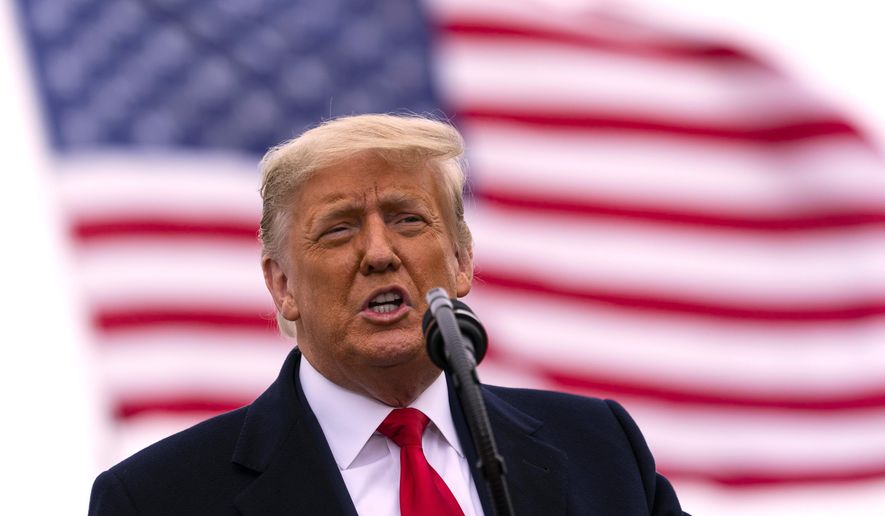OPINION:
A month ago, this column predicted that we had seen the peak of the Biden administration. Most people were reticent to come along with that notion, but on Tuesday, Gerard Baker over at the Wall Street Journal finally joined us.
The subsequent month has not been kind to President Biden. The Palestinians have figured out that our new president lacks a certain native energy. There is a slow-motion invasion of the southern border, where 178,000 people were apprehended trying to enter the U.S. illegally in April, the largest such number in two decades. Stir in a cyber-attack by Russians on the nation’s most important energy asset, and toss in bad job numbers and some inflation, and you have a dog’s breakfast of a presidency.
As noted earlier, all of it was predictable and predicted.
Now it is time to turn attention to President Trump. Obviously, the former president is well past peak — which was probably the State of the Union address in February 2020, before the pandemic and Mark Meadows destroyed his chances to win reelection.
No matter what you read, hear or think, it is unlikely that Mr. Trump will run again. The complexity of the system, his age and his legal, financial, and political infirmities all argue against it.
It turns out that it is difficult to run a political movement as a private citizen from Mar-a-Lago. For example, in the 6th Congressional District race in Texas, the president endorsed eventual front-runner Susan Wright very late — in part because there were numerous contenders in the Trump primary and he or his crew was afraid of picking the “wrong” candidate (i.e., one who wound up losing). The same mechanics were at play in the statewide Virginia Republican nomination process this month.
They will be in play in places as different as Ohio, where the race to replace Republican Sen. Rob Portman will no doubt include a handful of candidates close to the former president, and New York’s gubernatorial race. The New York race in particular is a good example of how political movements sometimes splinter as they grow. Lee Zeldin is without a doubt the best candidate the Republicans could put forward in the race for governor, but Team Trump has residual and irrational attachments to the Giuliani family, so they will probably dither about whom to support.
In short, the world is moving along and politicians are doing what they do (stealing ideas that work), and Mr. Trump’s ability to clear a primary field — let alone anoint a general election winner — is compromised precisely because there are multiple candidates vying for his imprimatur.
His social media presence also has waned. At apogee, Mr. Trump had about 90 million Twitter followers. Leading up to the 2020 election, his Facebook page had 336 million interactions, about seven times as many as President Biden’s 48 million.
Before Twitter banned him, he was mentioned anywhere from 7 million to 50 million times per week on Twitter. He is now mentioned about 3 million times per week on Twitter.
His absence from cable television is also problematic. More than half the nation (56%) still subscribes to cable television, while only 22% of Americans have a Twitter account. The New York Times estimated that his appearances on cable television were worth the equivalent of $2 billion in advertising.
What to do about Mr. Trump is, for some elected officials, a significant question. It is difficult to see this now, but it is a problem that will be solved soon and certainly not later than 2025. Even if Mr. Trump runs and wins in 2024 — which is the least likely outcome — he would be an immediate lame duck. In less than 44 months — and almost certainly sooner than that — his moment will start to wind down.
The good news is that we are going to have contested presidential primaries in both parties in 2024. Mr. Biden will not be able to run again (he was barely able to run in 2020), and as noted previously, Mr. Trump is unlikely to run again at the age of … 78.
Mr. Trump changed many things for Republicans. Most were for the good — clarity with respect to America first foreign and trade policies; a solid preference (at least rhetorically) for working people; an expansion of the sacred cows that could be critiqued and slaughtered; and an expansion of the party’s sense of the possible. He also, finally, mercifully, closed the book on the hagiography of President Reagan.
In many ways he midwifed a new Republican Party. The real challenge now is to figure out how to grow and build what he helped create through the next generation. The person who solves that will be the next Republican president.
• Michael McKenna, a columnist for The Washington Times, is the president of MWR Strategies. He was most recently a deputy assistant to President Trump and deputy director of the Office of Legislative Affairs at the White House.




Please read our comment policy before commenting.